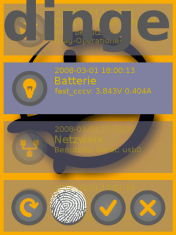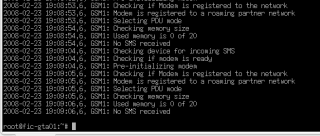Mar
1
The underground bubbles to the surface
17 years ago, at the start of March | 2 Comments
Mickey Lauer recently told us about some interesting developments presented at FOSDEM. More work has taken place and images can now be built – so as always that’s what I’m going to do. I’ll add this to my regular building regime – although the rate of change in this image will probably be a little slower than the main Openmoko and ScaredyCat images . The first one has already been uploaded to my buildhost so you can test it out for yourself right now. Please remember that although it works and you can make and receive calls this is experimental stuff. As long as you bear this in mind everyone will be happy.
already been uploaded to my buildhost so you can test it out for yourself right now. Please remember that although it works and you can make and receive calls this is experimental stuff. As long as you bear this in mind everyone will be happy.
There’s an awful lot of work gone into this by emdete (irc nick) for which he should be congratulated. Not only is it a working prototype but he has been thinking outside the box – more of this is needed for new opensource devices to make it in the marketplace. I’ve chatted to emdete on irc and he is aware of some of the shortcomings of this first release. Primarily he was keen to get a working version to demonstrate at FOSDEM, which makes sense. In the future we can look forward to a more modular approach and of course, for those of us who don’t speak German, localization.
These new images also serve as a test-bed for Mickey Lauer’s gsm mux daemon which, wonderfully, has a dbus interface, something I really would like to see in all the daemons in Openmoko.

Tagged with: image builds • neo 1973 • openmoko • opensource
March 1, 2008 21:00
Feb
23
Neo 1973 as an SMS gateway
17 years ago, at the end of February | Leave a Comment
Builds have been broken again recently, for about 5 days or so due to this,
../../libkoto/libkoto.a(koto-task-view.o): In function `on_note_activated’:
/builder/newBuild/build/tmp/work/armv4t-angstrom-linux-gnueabi/
openmoko-tasks2-0.1.0+svnr379-r1/trunk/libkoto/koto-task-view.c:261:
undefined reference to `koto_platform_edit_task’
(just in case someone feels the need to fix it – hint hint )
but that has given me a chance to start poking about with other things. One of those things happened to be smstools3. SMS Server Tools 3 (smstools3) can take  an ordinary phone or gsm modem and turn it into an SMS gateway that can send and receive SMS messages. Now, I don’t have a gsm modem but I do have a Neo 1973. Within 5 minutes I had SMS Tools compiled using the Openmoko toolchain. I’ve taken to using the toolchain quite a bit for testing before I create the .bb files so I can do proper building. Once I’d got a compiled smsd, I put together a simple /etc/smsd.conf file for the Neo (listed below).
an ordinary phone or gsm modem and turn it into an SMS gateway that can send and receive SMS messages. Now, I don’t have a gsm modem but I do have a Neo 1973. Within 5 minutes I had SMS Tools compiled using the Openmoko toolchain. I’ve taken to using the toolchain quite a bit for testing before I create the .bb files so I can do proper building. Once I’d got a compiled smsd, I put together a simple /etc/smsd.conf file for the Neo (listed below).
devices = NEO logfile = /var/log/smsd.log loglevel = 6 outgoing = /var/spool/sms/outgoing checked = /var/spool/sms/checked failed = /var/spool/sms/failed incoming = /var/spool/sms/incoming [NEO] device = /dev/ttySAC0 baudrate=115200 incoming = yes regular_run_interval=3600 regular_run_cmd=AT+CFUN=1 regular_run_cmd=AT+COPS pin = 1234
Obviously the /var/spool/sms directories needed to be created too. Before you start up smsd though you need to kill off gsmd by simply issuing the command
/etc/init.d/gsmd stop
gsmd will then stop and, from what I gather, power off the gsm chip. This bit is fairly important to know, since you actually need the chip to be powered up. We can do this simply by using the command
echo 1 > /sys/devices/platform/neo1973-pm-gsm.0/power_on
smsd can then be started, if you want to stop it forking use the -t switch on the command line. Incidentally, if you want to use the regular_run_xxx commands in your configuration you need to use the latest beta of smstools3. I needed to use them to get the Neo to register with the network, particularly as I’m actually roaming while doing this. To send an sms you simply copy a text file into the /var/spool/sms/outgoing directory – The format of the file in its simplest form is
To: destination-number message-text
That’s its most basic form, you can get much more complex. There are some very nice features in smstools particularly that you can trigger actions on the receipt of SMS messages.

Tagged with: linux • neo 1973 • openmoko
February 23, 2008 22:56
Feb
11
New SDK for Qtopia and Neo 1973
17 years ago, mid-February | 3 Comments
Today Trolltech have released a new Qtopia SDK for the Neo 1973. The download is and ISO which apparently contains a VMWare virtual machine so everything you need to compile and generate your own flash images is included. You’ll also need to get a copy of the Qtopia source of course, but you can get it here so that’s not a problem.

Tagged with: neo 1973 • opensource • qtopia • Trolltech
February 11, 2008 9:58
Jan
23
TrackMe on the Neo
17 years ago, at the end of January | 4 Comments
Remember when I mentioned my tracking application for the TomTom Go? Well last night I found a little bit of spare time so I could port it to the Neo 1973. I say ‘port’, it wasn’t so much ![]() a port as a ripping out of the TomTom specific stuff and adding a little GTK interface. It’s not massively impressive to look at but it is actually my first GTK application. There is quite a bit of hard coded stuff in there at the moment but I do intend to move this to a config file. Currently, if the distance between the previous and current positions is below a certain threshold, a packet is not transmitted at all and position checks only occur at 15 second intervals. The data that is sent out is encrypted with a very simple algorithm, but I’m more interested in low cpu usage and speed at this point. I’m also going to be fairly honest about the state of the code at the moment, it’s not a pretty sight at all. I need to put together something on the server side to decode the packets, I know I have it somewhere, it’s just a matter of locating it.
a port as a ripping out of the TomTom specific stuff and adding a little GTK interface. It’s not massively impressive to look at but it is actually my first GTK application. There is quite a bit of hard coded stuff in there at the moment but I do intend to move this to a config file. Currently, if the distance between the previous and current positions is below a certain threshold, a packet is not transmitted at all and position checks only occur at 15 second intervals. The data that is sent out is encrypted with a very simple algorithm, but I’m more interested in low cpu usage and speed at this point. I’m also going to be fairly honest about the state of the code at the moment, it’s not a pretty sight at all. I need to put together something on the server side to decode the packets, I know I have it somewhere, it’s just a matter of locating it.
I did wonder if the application should have an interface at all or if it should just run in the background, ‘secretly’ so that if someone stole your Neo you might actually be able to trace it.
The one thing that this did show me, however, is that you can’t actually run gllin for a particularly long time. I think it’s a minor fix but it does tend to fill up the free space on the Neo with its log data. I guess just disabling this might help, though I haven’t actually bothered to poke around with that just yet.
The other news is that to build this application I used the new toolchain and I have to say it makes life a whole lot easier. As a result I will also be building the toolchain at regular intervals and providing downloads via my buildhost. Sorry, but I can only build 32 bit versions at this time.

Tagged with: neo 1973 • openmoko • opensource • software • tracking
January 23, 2008 14:53
Nov
30
Openmoko gllin EULA
18 years ago, at the end of November | 2 Comments
Most people are now aware that the gps driver for the NEO 1973 is available once you’ve accepted the EULA, although strangely you can’t look in the docs folder to get at the GPL/LGPL notices or the readme until you’ve agreed to it. I can’t see a specific reason for this and it’s probably just a configuration error.
Aside from all the shouting at the end of the EULA, there is one sentence that did catch my eye and it was fairly early on.
“…removal of the Software from a country in which it is licensed shall automatically terminate this license.”
Notwithstanding the fact that I could pretty much guarentee that neither you or I would happen to know in which countries it is licensed in, apparently if you happen to wander into a country that is not on this list you just lost the right to use the software. I think it’s only fair to know the boundaries, can we have the list please.
Since the EULA doesn’t allow the distribution of the binary .ipk file I’m afraid that you aren’t going to see this in any non-official images either. I’m not even sure that it’s practical for the official images to contain it. What would be useful, however, is if the ‘firstboot’ scripts checked your SD card for the .ipk and automatically installed it for you. I’m fairly certain that I’ll start putting this into my images shortly.
Although it’s a binary only .ipk it is at least a step in the right direction and at least GTA01 owners can now legally use their gps.

Tagged with: neo 1973 • openmoko • software
November 30, 2007 10:53
Current Electricity Use (15min)
iPhone/Webkit RSS Reader
Links
- automated home
- Automated It Technology News
- awooga!!!
- LinITX
- My Acer page
- My Asterisk pages
- My Work in progress (old)
- Noble Race Car
- openmoko / neo 1973 wiki
- planet openmoko
- Spadgecock Cumpants
Tags
1-Wire android api Apple arduino currentcost DDAR development DVD FIC freerunner G1 google Google Phone gphone gprs GPS hardware image image builds inspiration iphone jailbreak kiosk linux Mac monitoring Music neo 1973 Nokia openmoko opensource OSX Pachube personal qtopia rhubarb rikki Rio slimp3 slimserver software tracking Trolltech u-bootTwitpic
Graphy Stuff





 ..the cat came back..
..the cat came back..